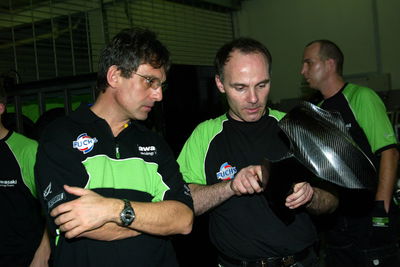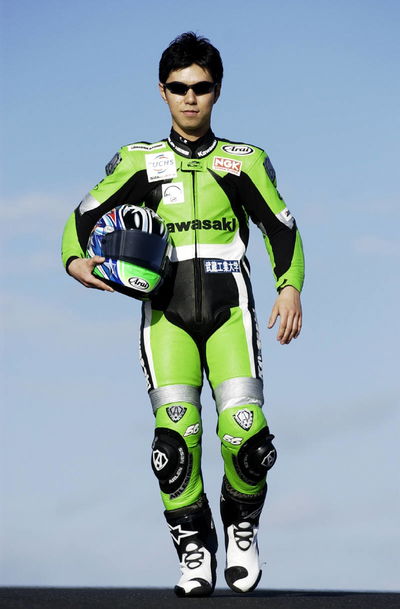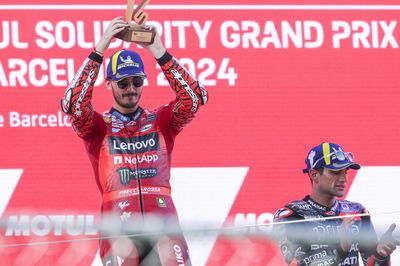Q&A: Harald Eckl (Kawasaki)
In 13 years of professional grand prix racing, Harald Eckl honed not only his skills as a rider, but also as a manager and racing engineer.
At a time when motorcycle manufacturers provided only the technical base, and competitive speed and horsepower depended largely on the initiative and ingenuity of the teams, Eckl always shone with ultra-fast and painstakingly prepared motorcycles, as well as a flawless professionalism in the public presentation of his team.

In 13 years of professional grand prix racing, Harald Eckl honed not only his skills as a rider, but also as a manager and racing engineer.
At a time when motorcycle manufacturers provided only the technical base, and competitive speed and horsepower depended largely on the initiative and ingenuity of the teams, Eckl always shone with ultra-fast and painstakingly prepared motorcycles, as well as a flawless professionalism in the public presentation of his team.
After achieving his own sporting successes with two German 250cc titles, a victory at the famous Daytona Speedweek and regular top ten finishes as one of the best privateers in the Grand Prix paddock, Eckl moved on to lead a factory-backed 125cc team in the world championship. He was an easy choice as a partner for Kawasaki when they came to base their World Superbike and World Supersport team in Europe.
After taking over the reins in 1997, Eckl's team not only won the World Supersport title, but also maintained its key role as one of the frontrunners of the World Superbike class despite increasingly tough competition from rule advantaged 1000cc twin-cylinder machines.
Eckl's unique combination of technical and managerial skills, together with more than two decades of racing experience, made him first choice to spearhead Kawasaki's return to grand prix racing in 2003 - and after a difficult debut season, the German has introduced major changes for the 2004 season...
Q: This will be the Kawasaki Racing Team's second year of MotoGP competition and there have been many changes since the end of last season. What have been the major changes and the reasons behind them?
Harald Eckl: I guess the most noticeable change is the bike, which looks very different to the Ninja ZX-RR on which we competed in 2003. The engine may currently be the same 990cc, inline four-cylinder unit as last year, but this is a completely new project, utilising a new chassis that has been designed to address some of the lessons we learnt in our debut season. We have also changed tyre suppliers to Bridgestone and made some radical changes to the structure of the team, including the rider line up. These changes are now starting to pay dividends, as our improved performance during the overseas tests in Malaysia demonstrates; there has been a dramatic improvement in lap times from one year ago.
Q: The new chassis has been built in co-operation with Eskil Suter (pictured with Eckl) and Suter Racing Technology in Switzerland. What are the benefits of building the chassis in Europe, rather than in Japan?
Harald Eckl: The new chassis has been developed jointly by Kawasaki and SRT and is now built in Europe. One of the main advantages of this change is that we've shortened the line of communications considerably and this has allowed us to react much more rapidly to rider feedback with design changes and modifications. A key group of engineers from the chassis department in Japan have moved to Switzerland and this integration into the European system and racing philosophy is an interesting step forward for our MotoGP project. One of the main consequences of this change is that Kawasaki engineers in Japan are now able to concentrate on engine development, which is, of course, also critical to our success.
Q: You mentioned the switch to Bridgestone tyres for the coming season, what was the reasoning behind this decision?
Harald Eckl: The right tyres are absolutely critical for success in MotoGP, mainly because of the performance and horsepower advances made with the prototype four-stroke machines in recent seasons. These machines require the highest possible level of grip from the tyres, combined with good durability, without which it would be difficult to be competitive. Bridgestone have proved what they can do in Formula 1 and, after only a brief period in MotoGP, they have already demonstrated the huge potential of their tyres. The performance of the Bridgestone tyres during preseason testing has been impressive, especially their consistency and durability, which I'm confident will give us an advantage towards the end of the race at some racetracks this season.
Q: Alex Hofmann gets his chance with a full time ride with Kawasaki this year, becoming the only German rider in the MotoGP world championship. What do you expect from him this season?
Harald Eckl: This is a fantastic opportunity for a rider like Alex; he is young, motivated and, in my opinion, his physical size makes him well suited to a big four-stroke bike. This year is very important for Alex, as it will be his chance to show what he can do over a full season, after demonstrating his potential during his five wild card outings in 2003. Being the only German rider in the MotoGP World Championship will only add to Alex's motivation, but I think it will also create some additional pressure, knowing that the eyes of Germany will be upon him every race weekend. But, he's a strong character and I'm confident that he can handle it.
Q: Joining Alex in the Kawasaki line-up is Shinya Nakano. What was it about Nakano that convinced you to sign him for the coming season?
Harald Eckl: I've watched Shinya for some time and I've always considered him a very good rider. I rated him highly as a 250cc competitor, but I was also impressed with what he achieved on the 500cc two-stroke and then on the big four-stroke MotoGP bike last year. With his experience of the Yamaha inline four-cylinder MotoGP bike, and the fact that we were about to embark on an intensive tyre development programme with Bridgestone, I didn't hesitate to contact him when I discovered he was without a definite ride for this season. Already Shinya has shown a good technical understanding of the Ninja ZX-RR, and his input to both the Kawasaki and Bridgestone development programmes has been valuable. He pushes the bike hard on track and I'm happy he decided that his future lay with the Kawasaki Racing Team.
Q: As a former Grand Prix rider yourself, how difficult has it been to make the transition to MotoGP team manager?
Harald Eckl: For me it's been a much bigger challenge than being a rider ever was. MotoGP is a massive championship, which means a lot of hard work on the part of the team. We are not one of the biggest teams in the paddock, which means that, as Team Manager, I have to look after a number of areas that perhaps other teams employ extra people to take care of. It means a bigger workload for me, but I thoroughly enjoy it; it's like another race that you have to win. You are always looking to do a better job within the organisation, whether that be working with the riders or focussing on the technical side of the racing, but it is a lot of fun. As an ex-rider, I think this is the best job for me.
Q: As a team, what do you see as your goals for the 2004 MotoGP World Championship.
Harald Eckl: Realistically our goal is for Shinya Nakano and Alex Hofmann to be in the points at every race, although we are well aware of just how strong the competition is this year. With six Hondas, four Yamahas and four Ducatis - all of which have proved capable of running at the front during preseason testing - not to mention the fast improving Suzukis, the battle for points scoring positions will be tough this season. In championship terms, if Shinya could repeat or better his tenth position from 2003 then that would be a fantastic result for the team.












